新概念英语第二册第4课-完整
新概念英语第二册复习笔记 第四课 课文讲解

新概念英语第二册复习笔记第四课课文讲解just 搭配现在完成时receive a letter from sb 相当于hear from sb 收到……来信write to sb 给…..写信Australia n.澳大利亚Australian adj. 澳大利亚的Italy n. 意大利Italian n. 意大利语for six monthsHe went there six months ago. 半年前他去那儿了。
He has been there since six months ago. 自从半年前他就去哪儿了。
He has been there for six months. 他已经在哪儿半年了。
for + 一段时间since + 时间的一点engineer n. 工程师,建筑师,机械师,火车司机engine n. 发动机;引擎,机车,火车头a steam engine 蒸汽机车engine-driver (Br) 火车司机engineer (U.S) 火车司机a number of + n.( pl.) + are……许多的,大量的eg. A large number of books are stolen. 大量的书籍被盗。
The number of + n.( pl.) + is….. ……的数量是eg. The number of stolen books is 25. 被偷的书的数目是25本。
eg. A number of people apply for this job. 许多人申请这份工作。
eg. The number of applicants is 70. 申请者的数目是70人。
number n. 号码,数字,数目eg. My telephone number is 6229897. 我的电话号码是6229897.No. ( short term 缩略形式)eg. The company is No. One in the oil business. 这家公司在石油领域是最棒的。
新概念英语_第二册_Lesson4

【辨】 exciting, thrilling ['θrɪlɪŋ] exciting 通常来形容让人很激动的人或事; thrilling 用来形容让人激动或害怕的发抖、令 人难以控制情绪的事
-ed自己感到 interested, bored, -ing令人感到interesting,boring, I am interested in this book. This is an interesting book.
in the centre (of sp),
adj. central中央的,中心的
■abroad adv. 在国外,到处,海外,广泛
get abroad 出去, 出门; (谣言)传出去, 传开 go abroad 去国外 live abroad 到国外定居 study abroad 到国外学习 She is hungry for news of her husband working abroad. 她渴望得到国外工作的丈夫的消息。 他在国外生活了许多年。 He lived abroad for many years. 你出国度假吗? Are you going abroad for your holidays? 他有生以来从未到过国外。 He’s never been abroad in his life.
excited 感到兴奋的
-ed自己感到 interested, bored, relaxed -ing令人感到interesting,boring,relaxing
Language points
4. He has just bought an Australian car and has gone to Alice springs. He has gone to the south.(还在) He has been to the south.(去过) 5. He is finding this trip very exciting. find+n+adj.觉得…怎么样 e.g.I find the film boring. Do you find the book very interesting?
新概念英语第二册第4课课件(共22张PPT)

课文链接(1)
课文链接(2)
课文链接(3)
课文链接(4)
课文链接(5)
Grammar(语法1):现在完成时
Grammar(语法2) 现在完成时
Summary writing.(摘要写作1)
1)What has the writer just received from his brother , Tim? The writer has just received a letter from his brother, Tim. 2)Is Tim an engineer, or is he a doctor? Tim is an engineer. 3)How long has he been in Australia? He has been in Australia for six months. 4)Has he already visited many places or not? Yes, he has already visited a great number of places. 5)Where is he now? He is in the small town Alice Springs in the centre of Australia. 6)Has Tim ever been abroad before or not ? No, he hasn’t been abroad before. 7)Is he enjoying his trip very much or not? Yes, he is enjoying his trip very much.
Read the text !
I have just received a letter from my brother,Tim. He is in Australia. He has been there for six months. Tim is an engineer. He is working for a big firm and he has already visited a great number of different places in Australia. He has just bought an Australian car and has gone to Alice Springs, a small town in the centre of Australia. He will soon visit Darwin. From there , he will fly to Perth. My brother has never been abroad before, so he is finding this trip very exciting.
新概念英语第二册课堂笔记:第4课
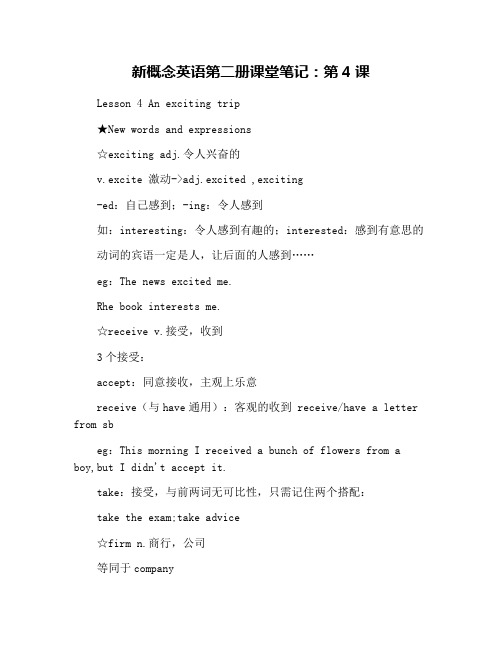
新概念英语第二册课堂笔记:第4课Lesson 4 An exciting trip★New words and expressions☆exciting adj.令人兴奋的v.excite 激动->adj.excited ,exciting-ed:自己感到;-ing:令人感到如:interesting:令人感到有趣的;interested:感到有意思的动词的宾语一定是人,让后面的人感到……eg:The news excited me.Rhe book interests me.☆receive v.接受,收到3个接受:accept:同意接收,主观上乐意receive(与have通用):客观的收到 receive/have a letter from sbeg:This morning I received a bunch of flowers from a boy,but I didn't accept it.take:接受,与前两词无可比性,只需记住两个搭配:take the exam;take advice☆firm n.商行,公司等同于company☆abroad adv.在国外注意是个副词,直接和动词连用,不需要介词go/live/study abroad★TextI have just received a letter from my brother Tim.He is in Australia.He has been there for six months.Tim is an engineer.He is working for a big firm and he has already visited a great number of different places in Australia.He ha just bought an Australian car and has gone to Alice Springs,a small town in the centre of Australia.He will soon visit Darwin.From there,he will fly to Perth.My brother has never benn abroad before,so he is finding this trip very exciting.☆have been+in 地点他已经到北京了:He has arrived in Beijing.他到北京一年了,就不能用arrive了。
新概念英语第二册第四课答案
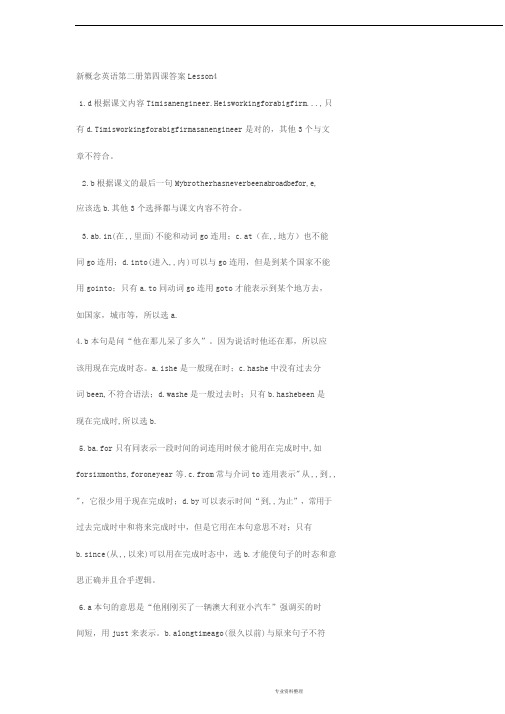
新概念英语第二册第四课答案Lesson41.d根据课文内容Timisanengineer.Heisworkingforabigfirm...,只有d.Timisworkingforabigfirmasanengineer是对的,其他3个与文章不符合。
2.b根据课文的最后一句Mybrotherhasneverbeenabroadbefor,e,应该选b.其他3个选择都与课文内容不符合。
3.ab.in(在,,里面)不能和动词go连用;c.at(在,,地方)也不能同go连用;d.into(进入,,内)可以与go连用,但是到某个国家不能用gointo;只有a.to同动词go连用goto才能表示到某个地方去,如国家,城市等,所以选a.4.b本句是问“他在那儿呆了多久”。
因为说话时他还在那,所以应该用现在完成时态。
a.ishe是一般现在时;c.hashe中没有过去分词been,不符合语法;d.washe是一般过去时;只有b.hashebeen是现在完成时,所以选b.5.ba.for只有同表示一段时间的词连用时候才能用在完成时中,如forsixmonths,foroneyear等.c.from常与介词to连用表示"从,,到,, ",它很少用于现在完成时;d.by可以表示时间“到,,为止”,常用于过去完成时中和将来完成时中,但是它用在本句意思不对;只有b.since(从,,以来)可以用在完成时态中,选b.才能使句子的时态和意思正确并且合乎逻辑。
6.a本句的意思是“他刚刚买了一辆澳大利亚小汽车”强调买的时间短,用just来表示。
b.alongtimeago(很久以前)与原来句子不符合。
styear(去年)也跟原来句子不符合。
d.sixmonthsago(6个月 前)也不对,句子中没有明确说明;只有a .a shor tt im ea (久前,最近)同just 的意思相近,所以应该选a. 7.c 本句需要用现在完成时,已经给出了助动词has,只需要填上过去分词就可以了。
新概念英语第二册第4课

• exciting adj. 令人兴奋的 excited adj. 兴奋的 -ed: 自己感到(修饰人) / -ing:令人感到(修饰物) It's an exciting story. Everybody feels excited about it. an exciting trip 激动人心的旅行 an exciting news 振奋人心的消息 interesting adj. 令人感到有趣的; interested adj. 感到有意思的
也可表示持续到现在的动作或状态。 He has learned English since 2001.
--从2001年开始学的,现在还在继续学着呢
sum up
一、现在完成时
1)构成 肯定句:主语+have/has+过去分词+其它 He has been to Australia. 否定句:主语+have/has not+过去分词+其它 He has not been to Australia. 疑问句:Have/Has+主语+过去分词+其它
Language points
1. I have just received a letter from my brother. 收到某人来信
get a letter from sb.
have a letter from sb.
hear from sb. 2.He is working for a big firm.
Summary writing
The writer has just received a letter from his brother, Tim. Tim is an engineer. He has been in Australia for six months. He has already visited many places. Now he is in Alice Springs. Tim has never been abroad before. He is enjoying his trip very much.
新概念英语第二册课后习题答案详解_1-10
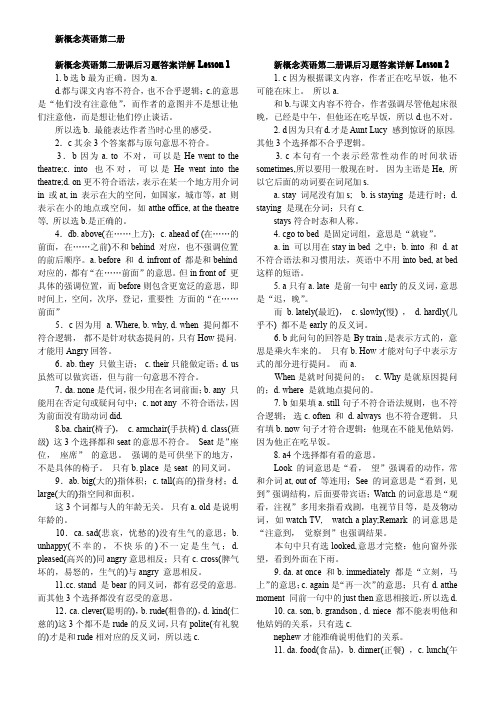
新概念英语第二册新概念英语第二册课后习题答案详解Lesson11.b选b最为正确。
因为a.d.都与课文内容不符合,也不合乎逻辑;c.的意思是“他们没有注意他”,而作者的意图并不是想让他们注意他,而是想让他们停止谈话。
所以选b.最能表达作者当时心里的感受。
2.c其余3个答案都与原句意思不符合。
3.b因为a.to不对,可以是He went to the theatre;c.into也不对,可以是He went into the theatre;d.on更不符合语法,表示在某一个地方用介词in或at,in表示在大的空间,如国家,城市等,at则表示在小的地点或空间,如atthe office,at the theatre 等,所以选b.是正确的。
4.db.above(在……上方);c.ahead of(在……的前面,在……之前)不和behind对应,也不强调位置的前后顺序。
a.before和 d.infront of都是和behind 对应的,都有“在……前面”的意思。
但in front of更具体的强调位置,而before则包含更宽泛的意思,即时间上,空间,次序,登记,重要性方面的“在……前面”5.c因为用 a.Where,b.why,d.when提问都不符合逻辑,都不是针对状态提问的,只有How提问,才能用Angry回答。
6.ab.they只做主语;c.their只能做定语; 虽然可以做宾语,但与前一句意思不符合。
7.da.none是代词,很少用在名词前面;b.any只能用在否定句或疑问句中;c.not any不符合语法,因为前面没有助动词did.8.ba.chair(椅子),c.armchair(手扶椅)d.class(班级)这3个选择都和seat的意思不符合。
Seat是”座位,座席”的意思。
强调的是可供坐下的地方,不是具体的椅子。
只有b.place是seat的同义词。
9.ab.big(大的)指体积;c.tall(高的)指身材;d. large(大的)指空间和面积。
新概念英语第二册第四课课文详解
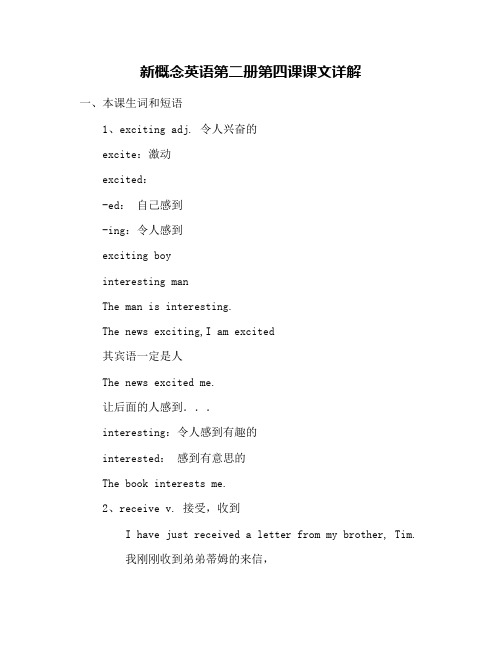
新概念英语第二册第四课课文详解一、本课生词和短语1、exciting adj. 令人兴奋的excite:激动excited:-ed:自己感到-ing:令人感到exciting boyinteresting manThe man is interesting.The news exciting,I am excited其宾语一定是人The news excited me.让后面的人感到...interesting:令人感到有趣的interested:感到有意思的The book interests me.2、receive v. 接受,收到I have just received a letter from my brother, Tim.我刚刚收到弟弟蒂姆的来信,receive[ri5si:v]vt.收到, 接到, 接收(receive的过去式和过去分词是received)re-前缀,表"又,重新"的意思。
Receive/ accept/和take的区别:accept:同意接收receive:客观的收到take take the exam:接收考试; take advice接收建议This morning I received a bunch of flowers from aboy,but I didn't acceptit.take take the exam:接收考试; take advice接收建议receive/havereceive/have a letter from somebody.3、firm n. 商行,公司Companyfirm 主要用在非正式场合和口语,Company 是公司的正式称呼。
4、abroad adv. 在国外副词,直接和动词连用go aroadlive abroadstudy abroad5、so he is finding this trip very exciting.所以,他觉得这次旅行非常激动人心。
新概念英语第二册第四课全课课件

n. 商行,公司
adj. 不同的
centre /'sentə/
abroad /ə'brɔːd/
n. 中心
adv. 在国外
DR
First listen and then answer the question. 听录音,然后回答以下问题。
1. How long has Tim been in Australia? Tim has been in Australia for six months. 2. What does he do in Australia?
常与_______、_____、(only) once、_____或three times等连用,可以 用________________提问,谓语:________v.;
e.g. ① I have already finished my lunch. 我已经吃过午饭了。 ② He has never been late for school. 他上学从未迟到过。
— I have lived here for about ten years. 我在这里住了大约十年了。
DR
21
c. 特别注意:
1. have gone to ( )& have been to( ) e.g. ① It can’t be John. He has gone to town. 那不可能是约翰,他进城了。 ② John knows the way well. He has been to the city before. 约翰很熟悉那里的路。他以前去过那个城市。
3. Why is Tim finding the trip exciting?
DR
裕兴 新概念英语 第二册 Lesson 4 第4课 笔记讲义
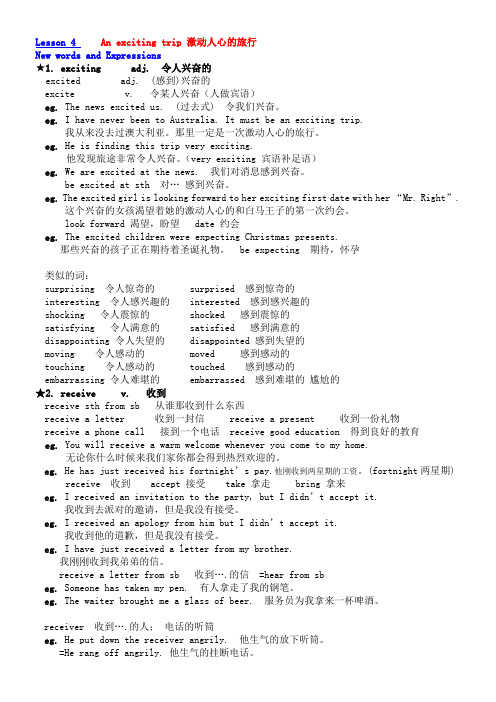
Lesson 4 An exciting trip 激动人心的旅行New words and Expressions★1. exciting adj. 令人兴奋的excited adj. (感到)兴奋的excite v. 令某人兴奋(人做宾语)eg. The news excited us. (过去式) 令我们兴奋。
eg. I have never been to Australia. It must be an exciting trip.我从来没去过澳大利亚。
那里一定是一次激动人心的旅行。
eg. He is finding this trip very exciting.他发现旅途非常令人兴奋。
(very exciting 宾语补足语)eg. We are excited at the news. 我们对消息感到兴奋。
be excited at sth 对…感到兴奋。
eg.The excited girl is looking forward to her exciting first date with her “Mr. Right”.这个兴奋的女孩渴望着她的激动人心的和白马王子的第一次约会。
look forward 渴望,盼望 date 约会eg. The excited children were expecting Christmas presents.那些兴奋的孩子正在期待着圣诞礼物。
be expecting 期待,怀孕类似的词:surprising 令人惊奇的 surprised 感到惊奇的interesting 令人感兴趣的 interested 感到感兴趣的shocking 令人震惊的 shocked 感到震惊的satisfying 令人满意的 satisfied 感到满意的disappointing 令人失望的 disappointed 感到失望的moving 令人感动的 moved 感到感动的touching 令人感动的 touched 感到感动的embarrassing 令人难堪的 embarrassed 感到难堪的尴尬的★2. receive v. 收到receive sth from sb 从谁那收到什么东西receive a letter 收到一封信 receive a present 收到一份礼物receive a phone call 接到一个电话 receive good education 得到良好的教育eg. You will receive a warm welcome whenever you come to my home.无论你什么时候来我们家你都会得到热烈欢迎的。
新概念英语第二册Lesson4课件
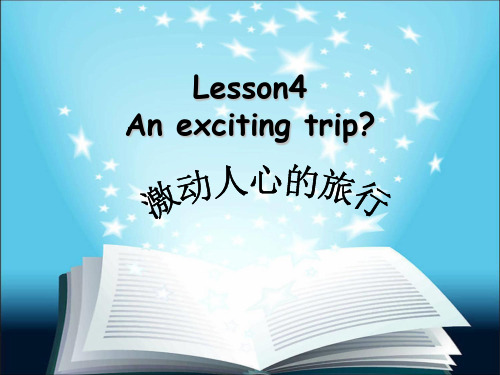
New words
firm n.商行,公司 law firm法律公司
公司
=company
different adj.不同的—— same相同的
adv. differently, n. difference
e.g. My coat is different from yours.
和…相同,一样
be the same with/as
--他们已经离开了,也就是说现在他们人不在这里
I have had my lunch.
--我已经吃过午饭了,也就是说我现在不饿
也可表示持续到现在的动作或状态。
He has learned English since 2001.
现在完成时与一般过去时的比较
1)一般过去时表示过去某时发生的动作或 单纯叙述过去的事情,强调动作;
yesterday.
6. There ___w_a__s(be) a telephone call for you just now. 7. When _d_i_d___ you _c_o__m__e(come) to China?
----Last year.
8. Yesterday I _t_h_o_u__g_h__t (think) that you were not in
现在完成时为过去发生的,强调过去的 事情对现在的影响,强调的是影响。
I saw this film yesterday. (强调看的动作发生过了。) I have seen this film. (强调对现在的影响,电影的内容已经知道 了。)
Grammar
2一般过去时常与具体的表示过去的时间状语连用; 现在完成时通常与模糊时间状语连用或无时间状语。
新概念英语第二册课后练习答案lesson4
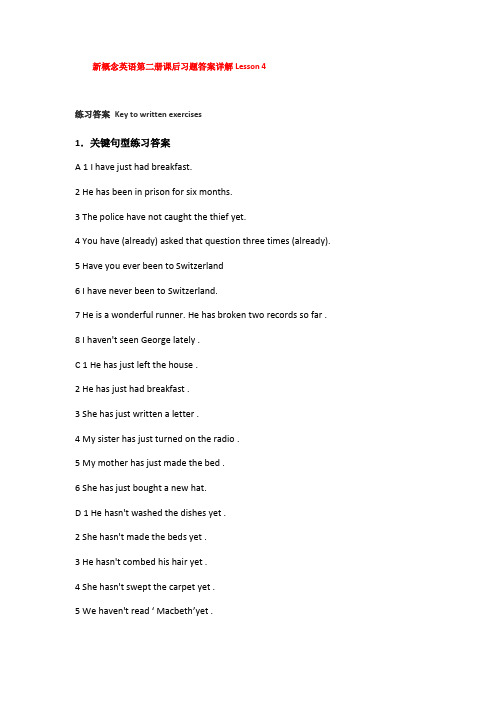
新概念英语第二册课后习题答案详解Lesson 4练习答案Key to written exercises1.关键句型练习答案A 1 I have just had breakfast.2 He has been in prison for six months.3 The police have not caught the thief yet.4 You have (already) asked that question three times (already).5 Have you ever been to Switzerland6 I have never been to Switzerland.7 He is a wonderful runner. He has broken two records so far .8 I haven't seen George lately .C 1 He has just left the house .2 He has just had breakfast .3 She has just written a letter .4 My sister has just turned on the radio .5 My mother has just made the bed .6 She has just bought a new hat.D 1 He hasn't washed the dishes yet .2 She hasn't made the beds yet .3 He hasn't combed his hair yet .4 She hasn't swept the carpet yet .5 W e haven't read ‘ Macbeth’yet .E 1 Have you seen the new play at ‘The Globe’yet2 Have you taken your holidays yet3 Have you read this book yet4 Have you done your homework yet5 Have you finished your work yet2 .难点练习答案1 received2 received3 took4 taken5 take3.多项选择题答案1. d根据课文内容Tim is an engineer. He is working for a big firm..., 只有d. Timis working for a big firm as an engineer 是对的,其他3个与文章不符合。
《新概念英语》第二册 电子版
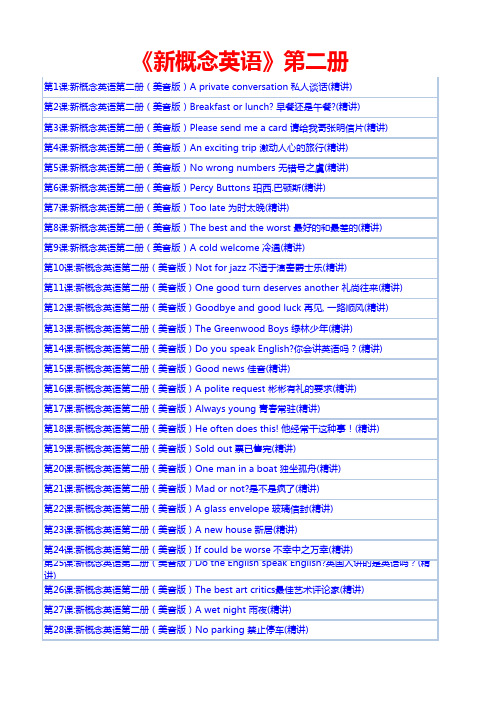
《新概念英语》第二册第1课:新概念英语第二册(美音版)A private conversation 私人谈话(精讲)第2课:新概念英语第二册(美音版)Breakfast or lunch? 早餐还是午餐?(精讲)第3课:新概念英语第二册(美音版)Please send me a card 请给我寄张明信片(精讲)第4课:新概念英语第二册(美音版)An exciting trip 激动人心的旅行(精讲)第5课:新概念英语第二册(美音版)No wrong numbers 无错号之虞(精讲)第6课:新概念英语第二册(美音版)Percy Buttons 珀西.巴顿斯(精讲)第7课:新概念英语第二册(美音版)Too late 为时太晚(精讲)第8课:新概念英语第二册(美音版)The best and the worst 最好的和最差的(精讲)第9课:新概念英语第二册(美音版)A cold welcome 冷遇(精讲)第10课:新概念英语第二册(美音版)Not for jazz 不适于演奏爵士乐(精讲)第11课:新概念英语第二册(美音版)One good turn deserves another 礼尚往来(精讲)第12课:新概念英语第二册(美音版)Goodbye and good luck 再见, 一路顺风(精讲)第13课:新概念英语第二册(美音版)The Greenwood Boys 绿林少年(精讲)第14课:新概念英语第二册(美音版)Do you speak English?你会讲英语吗?(精讲)第15课:新概念英语第二册(美音版)Good news 佳音(精讲)第16课:新概念英语第二册(美音版)A polite request 彬彬有礼的要求(精讲)第17课:新概念英语第二册(美音版)Always young 青春常驻(精讲)第18课:新概念英语第二册(美音版)He often does this! 他经常干这种事!(精讲)第19课:新概念英语第二册(美音版)Sold out 票已售完(精讲)第20课:新概念英语第二册(美音版)One man in a boat 独坐孤舟(精讲)第21课:新概念英语第二册(美音版)Mad or not?是不是疯了(精讲)第22课:新概念英语第二册(美音版)A glass envelope 玻璃信封(精讲)第23课:新概念英语第二册(美音版)A new house 新居(精讲)第24课:新概念英语第二册(美音版)If could be worse 不幸中之万幸(精讲)第25课:新概念英语第二册(美音版)Do the English speak English?英国人讲的是英语吗?(精讲)第26课:新概念英语第二册(美音版)The best art critics最佳艺术评论家(精讲)第27课:新概念英语第二册(美音版)A wet night 雨夜(精讲)第28课:新概念英语第二册(美音版)No parking 禁止停车(精讲)第29课:新概念英语第二册(美音版)Taxi! 出租汽车(精讲)第30课:新概念英语第二册(美音版)Football or polo? 足球还是水球?(精讲)第31课:新概念英语第二册(美音版)Success story 成功者的故事(精讲)第32课:新概念英语第二册(美音版)Shopping made easy 购物变得很方便(精讲)第33课:新概念英语第二册(美音版)Out of the darkness 冲出黑暗(精讲)第34课:新概念英语第二册(美音版)Quick work 破案 “神速”(精讲)第35课:新概念英语第二册(美音版)Stop thief!捉贼!(精讲)第36课:新概念英语第二册(美音版)Across the Channel 横渡海峡(精讲)第37课:新概念英语第二册(美音版)The Olympic Games 奥林匹克运动会(精讲)第38课:新概念英语第二册(美音版)Everything except the weather 唯独没有考虑到天气(精讲第39课:新概念英语第二册(美音版)Am I all right? 我是否痊愈?(精讲)第40课:新概念英语第二册(美音版)Food and talk 进餐与交谈(精讲)第41课:新概念英语第二册(美音版)Do you call that a hat? 你把那个叫帽子吗?(精讲)第42课:新概念英语第二册(美音版)Not very musical 并非很懂音乐(精讲)第43课:新概念英语第二册(美音版)Over the South Pole 飞越南极(精讲)第44课:新概念英语第二册(美音版)Through the forest 穿过森林(精讲)第45课:新概念英语第二册(美音版)A clear conscience 问心无愧(精讲)第46课:新概念英语第二册(美音版)Expensive and uncomfortable 既昂贵又受罪(精讲)第47课:新概念英语第二册(美音版)A thirsty ghost 嗜酒的鬼魂(精讲)第48课:新概念英语第二册(美音版)Did you want to tell me something? 你想对我说什么吗?第49课:新概念英语第二册(美音版)The end of a dream 美梦告终(精讲)第50课:新概念英语第二册(美音版)Taken for a ride 乘车兜风(精讲)第51课:新概念英语第二册(美音版)Reward for virtue 对美德的奖赏(精讲)第52课:新概念英语第二册(美音版)A pretty carpet 漂亮的地毯(精讲)第53课:新概念英语第二册(美音版)Hot snake 触电的蛇(精讲)第54课:新概念英语第二册(美音版)Sticky fingers 粘糊的手指(精讲)第55课:新概念英语第二册(美音版)Not a gold mine 并非金矿(精讲)第56课:新概念英语第二册(美音版)Faster than sound! 比声音还快!(讲解)第57课:新概念英语第二册(美音版)Can I help you, madam? 您要买什么,夫人?(精讲)第58课:新概念英语第二册(美音版)A blessing in disguise? 是因祸得福吗?(精讲)第59课:新概念英语第二册(美音版)In or out? 进来还是出去?(精讲)第60课:新概念英语第二册(美音版)The future 卜算未来(精讲)第61课:新概念英语第二册(美音版)Trouble with the Hubble 哈勃望远镜的困境(讲解)第62课:新概念英语第二册(美音版)After the fire 大火之后(精讲)第63课:新概念英语第二册(美音版)She was not amused 她并不觉得好笑(精讲)第64课:新概念英语第二册(美音版)The Channel Tunnel 海峡隧道(精讲)第65课:新概念英语第二册(美音版)Jumbo versus the police 小象对警察(精讲)第66课:新概念英语第二册(美音版)Sweet as honey! 像蜜一样甜!(精讲)第67课:新概念英语第二册(美音版)Volcanoes 火山(精讲)第68课:新概念英语第二册(美音版)Persistent 纠缠不休(精讲)第69课:新概念英语第二册(美音版)But not murder!并非谋杀!(精讲)第70课:新概念英语第二册(美音版)Red for danger 危险的红色(精讲)第71课:新概念英语第二册(美音版)A famous clock第72课:新概念英语第二册(美音版)A car called bluebird第73课:新概念英语第二册(美音版)The record-holder第74课:新概念英语第二册(美音版)Out of the limelight第75课:新概念英语第二册(美音版)SOS第76课:新概念英语第二册(美音版)April Fools Day第77课:新概念英语第二册(美音版)A successful operation第78课:新概念英语第二册(美音版)The last one?第79课:新概念英语第二册(美音版)By air第80课:新概念英语第二册(美音版)The Crystal Palace第81课:新概念英语第二册(美音版)Escape第82课:新概念英语第二册(美音版)Monster or fish?第83课:新概念英语第二册(美音版)After the elections第84课:新概念英语第二册(美音版)On strike第85课:新概念英语第二册(美音版)Never too old to learn第86课:新概念英语第二册(美音版)Out of control第87课:新概念英语第二册(美音版)A perfect alibi第88课:新概念英语第二册(美音版)Trapped in a mine第89课:新概念英语第二册(美音版)A slip of the tongue 第90课:新概念英语第二册(美音版)What第91课:新概念英语第二册(美音版)Three men in a basket 第92课:新概念英语第二册(美音版)Asking for trouble第93课:新概念英语第二册(美音版)A noble gift第94课:新概念英语第二册(美音版)Future champions第95课:新概念英语第二册(美音版)A fantasy第96课:新概念英语第二册(美音版)The dead return。
新概念英语第二册课后练习答案lesson4

新概念英语第二册课后习题答案详解Lesson 4练习答案Key to written exercises1.关键句型练习答案A 1 I have just had breakfast.2 He has been in prison for six months.3 The police have not caught the thief yet.4 You have (already) asked that question three times (already).5 Have you ever been to Switzerland6 I have never been to Switzerland.7 He is a wonderful runner. He has broken two records so far .8 I haven't seen George lately .C 1 He has just left the house .2 He has just had breakfast .3 She has just written a letter .4 My sister has just turned on the radio .5 My mother has just made the bed .6 She has just bought a new hat.D 1 He hasn't washed the dishes yet .2 She hasn't made the beds yet .3 He hasn't combed his hair yet .4 She hasn't swept the carpet yet .5 W e haven't read ‘ Macbeth’yet .E 1 Have you seen the new play at ‘The Globe’yet2 Have you taken your holidays yet3 Have you read this book yet4 Have you done your homework yet5 Have you finished your work yet2 .难点练习答案1 received2 received3 took4 taken5 take3.多项选择题答案1. d根据课文内容Tim is an engineer. He is working for a big firm..., 只有d. Timis working for a big firm as an engineer 是对的,其他3个与文章不符合。
(完整版)新概念英语第二册lesson-4(含课文、练习)
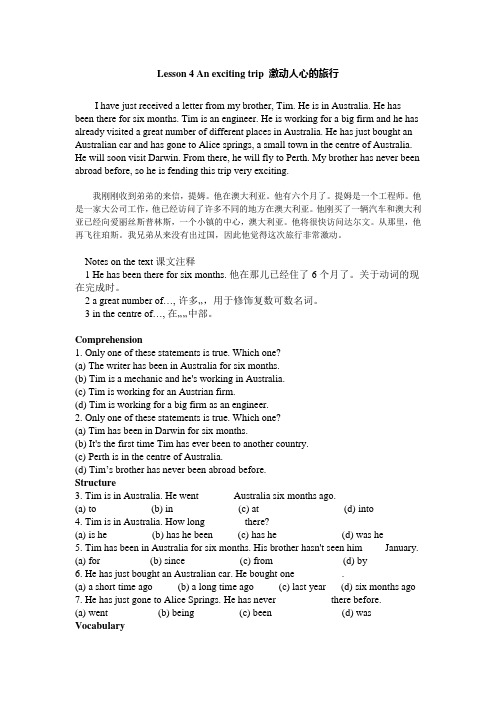
Lesson 4 An exciting trip 激动人心的旅行I have just received a letter from my brother, Tim. He is in Australia. He has been there for six months. Tim is an engineer. He is working for a big firm and he has already visited a great number of different places in Australia. He has just bought an Australian car and has gone to Alice springs, a small town in the centre of Australia. He will soon visit Darwin. From there, he will fly to Perth. My brother has never been abroad before, so he is fending this trip very exciting.我刚刚收到弟弟的来信,提姆。
他在澳大利亚。
他有六个月了。
提姆是一个工程师。
他是一家大公司工作,他已经访问了许多不同的地方在澳大利亚。
他刚买了一辆汽车和澳大利亚已经向爱丽丝斯普林斯,一个小镇的中心,澳大利亚。
他将很快访问达尔文。
从那里,他再飞往珀斯。
我兄弟从来没有出过国,因此他觉得这次旅行非常激动。
Notes on the text 课文注释1 He has been there for six months. 他在那儿已经住了6个月了。
关于动词的现在完成时。
2 a great number of…, 许多…,用于修饰复数可数名词。
3 in the centre of…, 在……中部。
新概念英语第二册课后练习答案lesson4
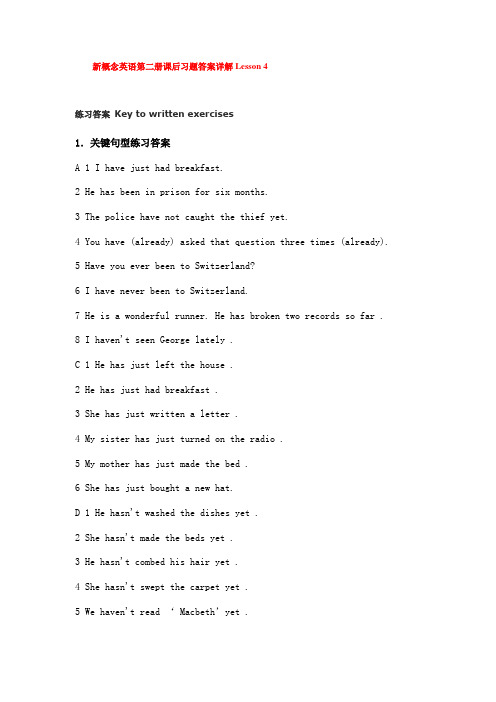
新概念英语第二册课后习题答案详解Lesson 4练习答案Key to written exercises1.关键句型练习答案A 1 I have just had breakfast.2 He has been in prison for six months.3 The police have not caught the thief yet.4 You have (already) asked that question three times (already).5 Have you ever been to Switzerland?6 I have never been to Switzerland.7 He is a wonderful runner. He has broken two records so far .8 I haven't seen George lately .C 1 He has just left the house .2 He has just had breakfast .3 She has just written a letter .4 My sister has just turned on the radio .5 My mother has just made the bed .6 She has just bought a new hat.D 1 He hasn't washed the dishes yet .2 She hasn't made the beds yet .3 He hasn't combed his hair yet .4 She hasn't swept the carpet yet .5 We haven't read ‘ Macbeth’yet .E 1 Have you seen the new play at ‘The Globe’yet ?2 Have you taken your holidays yet ?3 Have you read this book yet ?4 Have you done your homework yet ?5 Have you finished your work yet ?2 .难点练习答案1 received2 received3 took4 taken5 take3.多项选择题答案1. d根据课文内容Tim is an engineer. He is working for a big firm..., 只有d. Timis working for a big firm as an engineer 是对的,其他3个与文章不符合。
新概念英语第二册课后题答案详解:Lesson4
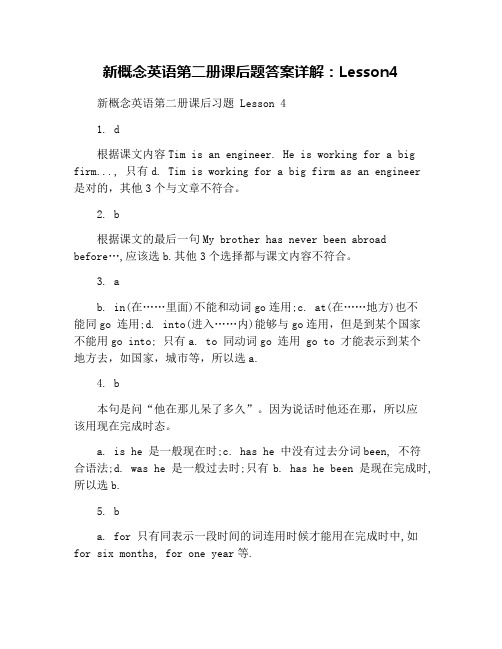
新概念英语第二册课后题答案详解:Lesson4新概念英语第二册课后习题 Lesson 41. d根据课文内容Tim is an engineer. He is working for a big firm..., 只有d. Tim is working for a big firm as an engineer 是对的,其他3个与文章不符合。
2. b根据课文的最后一句My brother has never been abroad before…,应该选b.其他3个选择都与课文内容不符合。
3. ab. in(在……里面)不能和动词go连用;c. at(在……地方)也不能同go 连用;d. into(进入……内)能够与go连用,但是到某个国家不能用go into; 只有a. to 同动词go 连用 go to 才能表示到某个地方去,如国家,城市等,所以选a.4. b本句是问“他在那儿呆了多久”。
因为说话时他还在那,所以应该用现在完成时态。
a. is he 是一般现在时;c. has he 中没有过去分词been, 不符合语法;d. was he 是一般过去时;只有b. has he been 是现在完成时, 所以选b.5. ba. for 只有同表示一段时间的词连用时候才能用在完成时中,如for six months, for one year等.c. from 常与介词to连用表示"从……到……",它很少用于现在完成时;d. by 能够表示时间“到……为止”,常用于过去完成时中和将来完成时中,但是它用在本句意思不对;只有b. since(从……以来)能够用在完成时态中,选 b.才能使句子的时态和意思准确并且合乎逻辑。
6. a本句的意思是“他刚刚买了一辆澳大利亚小汽车”强调买的时间短,用just来表示。
b. a long time ago(很久以前)与原来句子不符合。
c. last year(去年)也跟原来句子不符合。
- 1、下载文档前请自行甄别文档内容的完整性,平台不提供额外的编辑、内容补充、找答案等附加服务。
- 2、"仅部分预览"的文档,不可在线预览部分如存在完整性等问题,可反馈申请退款(可完整预览的文档不适用该条件!)。
- 3、如文档侵犯您的权益,请联系客服反馈,我们会尽快为您处理(人工客服工作时间:9:00-18:30)。
作品欣赏 谢谢观看!
be different from 与 ……不同
e.g. My coat is different from yours.
adv. differently, n. difference
New words
centre n.中心,中央(美式center) adj. central 中央的,中心的
in the centre of
(强调对现在的影响,电影的内容已经知道了.)
基本结构
时间状语
一般过去时的时间状语: yesterday, last … ,…ago, in1990, in October, just now, …
现在完成时的时间状语: for, since, so far/ up to now/ by now, never, ever, just, already, yet, recently/ lately ,动作发生的次数…
This is an interesting book.
New words
receive v.接受,收到(客观的收到)
This morning I received a bunch of flowers.
receive a letter (from sb.)= hear from sb. 我昨天收到Tom的来信。
Lesson 4 An exciting trip
New words
exciting adj. 令人兴奋的
excited 感到兴奋的 -ed自己感到 interested, bored -ing令人感到interesting,boring e.g. I am interested in this book.
Is Mr Baker at home? Sorry, he isn’t in. He ____ Dalian for vacation. A has gone B went C is going D goes Mr Zhang is a teacher of rich experience. He ___ English for 20 years. A has taught B will teach C teaches D taught
central park, the city centre abroad adv. 在国外
e.g. go abroad, study abroad live abroad, be abroad
Language points
1. I have just received a letter from my brother.
Grammar
past 一般过去时
now
future
一般过去时表示的是纯粹在过去发生的事情或过去某时 发生的动作
现在完成时表示的是在过去某个时间开始并持续到现在 的动作/状态,或者发生在过去却对现在造成的影响
I saw this film yesterday. (强调看的动作发生过了。) I have seen this film.
同义 accept同意,接受(主观)
e.g. This morning I received a bunch of flowers but I didn’t accept it.
New words
firm different
n.商行,公司 law firm法律公司 = company公司 adj.不同的—— same相同的
He _____ our school for two weeks.
A left B has left C has been away from
-- My father ____Shanghai with my grandparents.
--Really? ____ will they come back?
I have ___ to Beijing twice.
Sorry. He isn't at home. He has ____ to Beijing
5. He is finding this trip very exciting.
find+n+adj.觉得…怎么样
e.g. 1.I find the film disappointing 2.He finds the book very interesting 3. We find him great. 4.I find the flowers beautiful.
A has been to, How soon B has gone to, How soon C has been to , How long D has gone to, How long
She ___ that same song so many times. I’m getting sick of it!
--Will you go shopping with me _____ my shirts.
A wash
B have washed
C washed D am washing
How long have you ______ the magazine? About a week. A found B borrowed C received D had ____ you _____ the film Harry Potter 5? Not yet. I will see it this Sunday. A Did, see B Are, seeing C Have, seen D Do, see
Language points
4. He has just bought an Australian car and has gone to Alice springs.
He has gone to the south.(还没回来或在路 上) He has been to the south.(去过:已回来)
How is Ann? I ____ her for a long time. A don’t see B won’t see C didn’t see D haven’t seen Hasn’t Betty come yet? No, and I ____ for her for nearly 2 hours. A wait B waited C have waited D had waited
收到某人来信 get a letter from sb. have a letter from sb. hear from sb.
2.He is working for a big firm. 在…上班、任职,还可以用work at/in
e.g.My father works for a company.
3. he has already visited a great number of different places in Australia.
a number of+可数名词的复数 a great number of = a great / good many + 可复
a great amount of = a great deal of + 不可数名词
A sings B sang C will sing D has sung
--Mike, you ___ the magazine since last week. Can you return it now?
--Sure.
A borrowed B have borrowed C have kept
--How many times have you ____ to Xi’an? --Three times. A been B went C gone D go I won’t forget my teacher because she ____ so kind to me since I came to this school. A has been B will be C was D is
